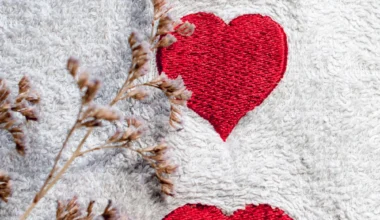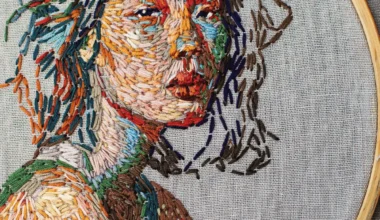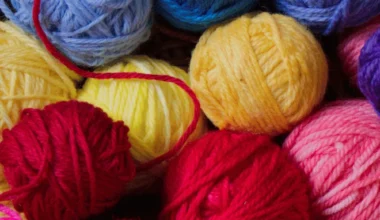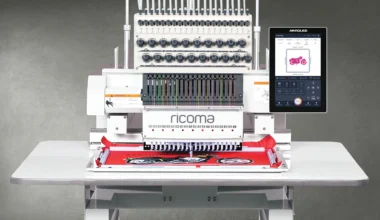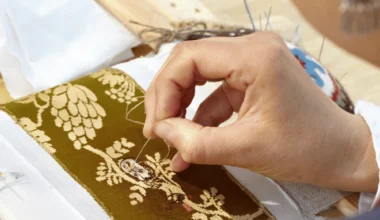The Best Embroidery Thread: What Does It Mean?
Choosing the best embroidery thread is essential for creating beautiful and durable designs. But what exactly makes a thread the best embroidery thread?
It all boils down to a few key factors like durability, colorfastness, and finish. Let’s get right into it!
Factors to Consider When Choosing The Best Thread for Embroidery

Material
The material of the thread is one of the most important factors to consider. Different materials offer unique benefits and drawbacks, making them suitable for various types of projects and fabric types.
Polyester is considered the best embroidery thread for machine embroidery by many embroiderers. It is known for its strength and durability, making it ideal for items that will be washed frequently, such as clothing and household linens. Polyester thread also has excellent colorfastness, meaning it won’t fade or bleed when washed. However, it has a slightly less natural look compared to some other materials.
Rayon thread, on the other hand, is prized for its high sheen and vibrant colors. It gives a beautiful, glossy finish that is perfect for decorative stitching. Rayon is softer and more flexible than polyester, making it easier to work with for intricate designs. However, it is not as strong as polyester and may not hold up as well under heavy use or frequent washing.
Cotton thread offers a natural matte finish, which is ideal for traditional and vintage embroidery styles. It is strong and has a soft, smooth texture, making it easy to work with on natural fabrics like cotton and linen. Cotton thread is less likely to create friction or heat during embroidery, which helps prevent fabric damage. However, it may not be as durable as polyester for items that require frequent laundering.
Silk thread is luxurious and strong, with a natural sheen that enhances the beauty of embroidery. It is highly prized for its smooth texture and ability to take on vibrant colors. Silk is often used for high-end projects and fine fabrics. However, it is more expensive than other types of thread and requires careful handling to avoid damage.
Color

Color selection in embroidery is crucial when choosing the best embroidery thread for machine embroidery because it sets the tone and mood for the entire piece.
To ensure the best color match, using color charts and testing threads on fabric swatches is highly recommended. Color charts allow you to see the exact shades available and compare them directly with your fabric and other threads.
Testing threads on small fabric swatches helps you see how the colors look when stitched and how they react to washing and light exposure. This step can save you from potential disappointments and help you choose the best embroidery thread for your project.
Weight
The concept of thread weight refers to the thickness of the thread, and it significantly influences the appearance and texture of embroidery. Thread weight is usually measured in numbers, with lower numbers indicating thicker threads. For example, a 40 wt (weight) thread is thicker than a 60 wt thread. The weight of the thread affects the coverage, texture, and detail of the embroidery.
Common thread weights like 40 wt and 60 wt are used for different applications. A 40 wt thread provides good coverage and is commonly used for general embroidery purposes, making it suitable for most fabrics. It creates bold, prominent stitches that stand out. In contrast, a 60 wt thread is finer and often used for detailed work, fine lettering, or when a more delicate and subtle finish is desired. This weight is ideal for intricate designs and lightweight fabrics.
Choosing the best machine embroidery thread weight for the fabric and the desired effect in the design is crucial.
Brand and Quality
Choosing the best thread for embroidery brands is essential for achieving consistent and durable embroidery results. High-quality threads are known for their strength, colorfastness, and smooth texture, which significantly impact the ease of use and the final appearance of your embroidery. Using subpar threads can lead to problems such as frequent breakage, uneven stitches, and faded colors, all of which can detract from the beauty and longevity of your work.
Several popular, reputable brands in the embroidery industry are known for their high-quality threads. Brands like Madeira, Isacord, and Robison-Anton are renowned for their consistency and durability. These brands offer a wide range of colors and thread types, catering to the diverse needs of embroiderers.
Project Requirements
When selecting threads, it’s crucial to consider the specific requirements of your project. Different projects, such as clothing, home decor, or accessories, may necessitate different thread types to achieve the best results.
For clothing items, you’ll need threads that are strong, durable, and colorfast. Polyester threads are an excellent choice for garments because they withstand frequent washing and wear while maintaining their color and strength.
For delicate fabrics or fine details, rayon threads can provide a beautiful, shiny finish, but they may not be as durable as polyester for high-use items.
Home decor projects, like pillows or wall hangings, benefit from threads that add visual appeal and can handle occasional cleaning. Cotton threads are a good option here, offering a soft, natural look with good durability.
For more decorative pieces, silk threads can add a touch of luxury and elegance, though they require careful handling and are best suited for items that won’t be heavily used.
Accessories, such as bags or hats, need threads that can endure everyday use and exposure to the elements. Polyester threads again are a solid choice due to their durability and resistance to fading.
For more intricate designs, consider using a blend of polyester and rayon threads to combine durability with a beautiful finish.
Tips for Selecting the Best Embroidery Thread

Match Thread Weight to Fabric Weight
Matching the thread weight to the fabric weight is crucial for achieving smooth and professional-looking embroidery. If the thread is too heavy for the fabric, it can cause puckering or even tear the fabric. Conversely, if the thread is too light, it may not hold up well and could break during the stitching process.
For light fabrics, such as silk or lightweight cotton, a finer thread, like 60 wt, is recommended. This thread weight is delicate enough to work seamlessly with the fabric without causing damage or distortion.
For medium-weight fabrics, like standard cotton or linen, a 40-watt thread is typically a good choice. This weight offers a balance of strength and coverage, making it suitable for a wide range of projects.
For heavy fabrics, such as denim or canvas, a thicker thread, like 30 wt or even 20 wt, is necessary to provide the durability and coverage needed for the robust material.
Consider the Project Technique
Different embroidery techniques can significantly influence thread choice, as each technique may require specific thread characteristics to achieve the best results. For example, a satin stitch, which involves long, smooth stitches, benefits from a thread with a high sheen and smooth texture, such as rayon or silk. These threads create a polished, professional look that enhances the beauty of the satin stitch.
Cross-stitch, which involves creating small, precise X-shaped stitches, generally works well with cotton or polyester threads. These threads offer good durability and a matte finish that suits the traditional look of cross-stitch patterns. For free-motion embroidery, where the design is created by moving the fabric under the needle in a freestyle manner, a versatile thread like polyester is ideal. It provides the strength needed for continuous stitching and resists breakage.
When working with techniques that involve layering or dense stitching, such as fill stitches or heavy embroidery, it’s essential to choose threads that can withstand the increased tension and friction. Polyester and cotton threads are excellent choices for these applications due to their strength and durability.
Test Before Starting

Testing threads on a small sample of fabric before committing to the entire project is crucial for achieving the best results. This step helps you avoid potential issues like color bleeding, thread breakage, or unsatisfactory appearance, which can ruin your final piece. By testing first, you can make the necessary adjustments to ensure your embroidery project turns out perfectly.
Keeping a sample book or swatch chart to document successful thread and fabric combinations is highly recommended. This record will serve as a valuable reference for future projects, allowing you to easily replicate successful combinations and avoid those that didn’t work well. Over time, this practice will help you build a personalized library of tested and trusted thread-fabric pairs!
Start Your Embroidery Journey With Ricoma’s SWIFT!
Ricoma’s SWIFT embroidery machine is perfect for anyone wanting to create amazing embroidery projects. Our machine is easy to use and works with many different types of threads, so both beginners and experts can enjoy it.
When you compare our embroidery machines, you’ll see why so many people choose Ricoma. Plus, with Chroma digitizing software, you can take your designs to the next level. Trust Ricoma to help you make professional-looking embroidery every time!


